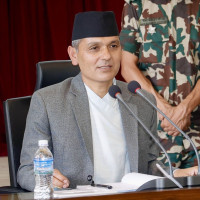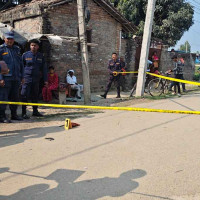- Friday, 20 February 2026
Citizen-centric Police: Partnership With People
As a major law enforcement organisation, the Nepal Police bears critical responsibilities on its shoulders with the objectives of maintaining law and order, delivering services, investigating crimes and controlling criminal activities professionally. This security organisation is accountable to the people to advance the welfare of all citizens at both the individual and community levels. While enforcing laws in the country, it has equally focused and prioritised its responsibilities in accomplishing service-oriented activities, which are closely linked to the communities' overall security.
This approach is defined in the modern security paradigm with utmost urgency to establish a secure and developed nation. For the development of the country, perpetual peace is a necessity, which in turn, demands a well-secured society. The approach of 'doing things rightly' does not stand out effectively and relies solely on traditional approaches. The Nepal police does not have any leverage to ignore citizens due to its accountability and answerability to them. The reason behind this is that people pay taxes to the government, and all the public servants, including police personnel, receive their salaries and other fringe benefits from the consolidated fund generated through taxes. The basic idea of being citizen-centric policing is to ensure the public that the police exist to serve them, not to rule over them.
Rule of law
In citizen-centric policing, police are more responsible, professional and competent enough to protect the lives, property, and rights of citizens, reassuring them that the country is governed by the rule of law rather than 'rule by law'. The police are the public and the public are police. As the police are entrusted with the vital responsibility to keep internal security of the country highly maintained, so the responsibility is equally imperative for the general public to cooperate with them. Respecting the laws begins with respect for those who enforce them.
Every citizen must uphold the laws and regulations of the country. When people violate these laws, it increases the risk of anarchy in society, which ultimately weakens and damages the nation's image and stability. Those who enjoy rights and freedoms vested by the Constitution must recognise the duties they are expected to fulfil. A more secure and safer society can only be established once the police receive active support from the community. Unless there is a collective effort between the law enforcement agency and civilians, the ultimate goal of a secure and just society remains out of reach.
Now arises a pertinent question: how can a community cooperate with the law enforcement agency? There exist myriad avenues through which the community can bolster the programmes conducted by the police, such as fostering community vigilance, promoting intergroup tolerance, facilitating emergency response mechanisms, developing cybersecurity awareness among the residents, actively participating in community policing initiatives and more. In this context, it must be unequivocally understood that the police cannot work in isolation or in institutional detachment, because they are the indispensable constituents of the societal fabric and they need the sustained cooperation of local residents and people at large.
The Nepal Police has launched two specialised programmes tailored to address the needs of common people – the Community-Police Partnership Programme and Help-Desk for Women and Children Programme – both of which engage communities in public welfare activities and offer assistance to vulnerable and victimised persons. Such programmes serve to bridge the gap between the police and the general public, a gap often perpetuated due to a low level of public trust. Such a gap did not emerge over just one or two decades; rather, it has deep historical roots, originating from a time when the police were not envisioned as public service providers.
At present, the police organisation is infused with new blood - individuals driven by altruistic ideals, democratic norms and behaviour, and a strong sense of career ambition. Their modern education and global exposure have heightened the level of awareness on human rights, duty fulfilment and accountability to the people. As a result, the present new generation of police is actively working to develop a 'police-people partnership' to rebuild trust and mutual respect.
Mutual trust
This represents one facet of reality. On the other hand, a major obstacle to rebuilding mutual trust lies in the behavioural conduct of the police personnel. If a police officer fails to demonstrate professionalism and etiquette with the service seekers, it fosters negativity and erodes public confidence. Additionally, media representation also counts a lot in shaping the positive image of the police organisation. Sensationalised media coverage of incidents involving police personnel can significantly sway public opinion, often overshadowing the positivity of police efforts and reforms being undertaken.
Citizen-centric policing is imperative to safeguard democracy and to foster a just and peaceful society. Modern-day citizens are fundamentally advanced than those of the past. There were the days when a single police officer could arrest ten persons from a village for investigation and without resistance. But, in contrast, today it may take ten police officers to apprehend and bring one individual from his home for investigation. This change reflects a growing public awareness and empowerment. Now the people have the confidence to ask 'why?' and demand accountability.
(The author is a former government secretary.)














